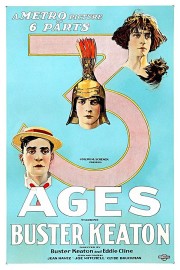Three Ages
Watching it this morning, for the first time in a long time, I think Buster Keaton’s “Three Ages” may be my favorite of Keaton’s minor efforts. Of course, there are the classics like “Sherlock Jr.” and “The General,” “Our Hospitality,” “The Cameraman,” “The Navigator” and “Steamboat Bill Jr.,” but movies like “College” and “Seven Chances” and “Three Ages” have a place, as well. You don’t necessarily think about them, but when you watch it again, you can’t help but smile and just enjoy the time you spend with it. This isn’t a masterpiece, but it’s silly and wonderful to watch.
Keaton and co-director Eddie Cline structure the film in three parts, moving in synchronicity, as they tell the story of a young man and his attempts to woo a woman, while dealing with a different suitor (and the woman’s parents) during the stone age, ancient Rome, and the present day. Each story follows a similar story of rises and falls in these attempts, and all end in the same place after some challenges, and quick thinking, on The Great Stone Face’s part.
“Three Ages” feels problematic in the #MeToo era, but honestly, so do Chaplin’s films, at this point. Keaton doesn’t treat his female characters as prizes to be won, because they have some personality of their own. Keaton’s character has to earn their affection through his actions, and it’s only after they’ve proven themselves worthy that the love story is complete. Keaton is one of my favorite film personalities, and that’s part of why something such as “Three Ages” works. This is as predictable, with a conclusion so expected, as film comedy gets, but it’s infinitely watchable, and it’s because Keaton understands storytelling, and cinematic execution. The execution is where “Three Ages” lands as film entertainment. We see the requisite Keaton stunts like him finding prehistoric ways to fight his competition for his woman’s heart; a chariot race that takes an unexpected turn; and Buster has to play a football game to prove his strength in the modern era. The film isn’t a meditation on the art of cinema and dreams like “Sherlock Jr.”; a comedy of manners like “Our Hospitality”; or an epic like “The General,” and it doesn’t need to be for “Three Ages” to be a funny, exciting silent surprise.










